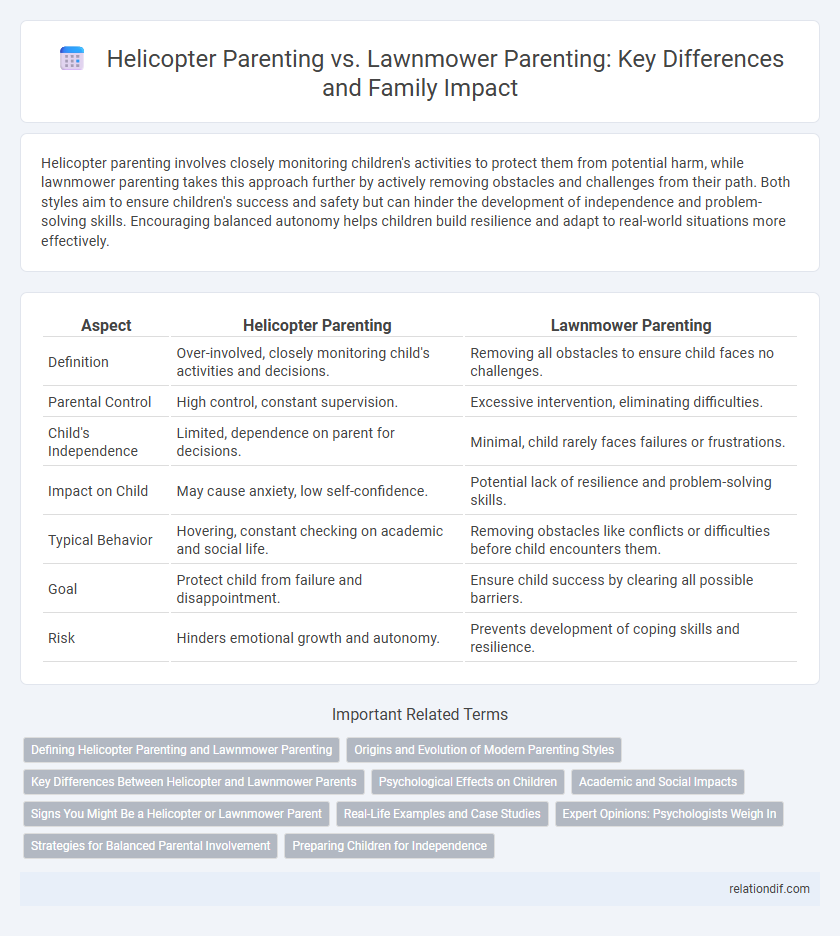Helicopter parenting involves closely monitoring children's activities to protect them from potential harm, while lawnmower parenting takes this approach further by actively removing obstacles and challenges from their path. Both styles aim to ensure children's success and safety but can hinder the development of independence and problem-solving skills. Encouraging balanced autonomy helps children build resilience and adapt to real-world situations more effectively.
Table of Comparison
| Aspect | Helicopter Parenting | Lawnmower Parenting |
|---|---|---|
| Definition | Over-involved, closely monitoring child's activities and decisions. | Removing all obstacles to ensure child faces no challenges. |
| Parental Control | High control, constant supervision. | Excessive intervention, eliminating difficulties. |
| Child's Independence | Limited, dependence on parent for decisions. | Minimal, child rarely faces failures or frustrations. |
| Impact on Child | May cause anxiety, low self-confidence. | Potential lack of resilience and problem-solving skills. |
| Typical Behavior | Hovering, constant checking on academic and social life. | Removing obstacles like conflicts or difficulties before child encounters them. |
| Goal | Protect child from failure and disappointment. | Ensure child success by clearing all possible barriers. |
| Risk | Hinders emotional growth and autonomy. | Prevents development of coping skills and resilience. |
Defining Helicopter Parenting and Lawnmower Parenting
Helicopter parenting involves closely monitoring and excessively intervening in a child's life to prevent any potential failures, often limiting the child's independence. Lawnmower parenting takes this approach further by actively removing all obstacles or challenges from a child's path to ensure smooth, effortless success. Both styles can hinder the development of resilience and problem-solving skills in children.
Origins and Evolution of Modern Parenting Styles
Helicopter parenting emerged in the late 20th century, characterized by intense monitoring and involvement aimed at safeguarding children from risks. Lawn mower parenting evolved later, with parents actively removing obstacles to prevent children from encountering any challenges or failures. Both styles reflect shifts in societal fears and educational pressures, shaping modern parenting's intricate balance between protection and fostering independence.
Key Differences Between Helicopter and Lawnmower Parents
Helicopter parents closely monitor and intervene in their children's daily activities to prevent any mistakes or failures, while lawnmower parents actively remove obstacles and challenges to ensure a smooth path to success. The key difference lies in the approach: helicopter parents hover and supervise, whereas lawnmower parents clear the way by eliminating difficulties before they arise. Both parenting styles can impact a child's ability to develop independence and problem-solving skills.
Psychological Effects on Children
Helicopter parenting often leads to increased anxiety and reduced self-efficacy in children due to overprotection and limited opportunities for independent problem-solving. Lawnmower parenting exacerbates these effects by removing obstacles entirely, which can hinder the development of resilience and coping skills. Both styles can contribute to heightened stress levels and difficulty in managing challenges during adolescence and adulthood.
Academic and Social Impacts
Helicopter parenting often leads to heightened academic pressure, resulting in increased student stress and reduced self-efficacy, while limiting opportunities for independent problem-solving and social skill development. Lawnmower parenting, characterized by removing obstacles entirely, can hinder resilience and adaptability, causing children to struggle academically and socially when facing challenges without parental intervention. Both parenting styles negatively impact the development of critical thinking and interpersonal relationships essential for long-term academic success and social integration.
Signs You Might Be a Helicopter or Lawnmower Parent
Constantly intervening in a child's social conflicts and academic challenges signals helicopter parenting, as it involves excessive control and overprotection. Lawnmower parenting is evident when parents remove every obstacle in the child's path, preventing them from facing consequences or building resilience. Frequent communication about daily schedules and guarding against any form of failure are key signs differentiating these overinvolved parenting styles.
Real-Life Examples and Case Studies
Helicopter parenting involves parents closely monitoring their children's activities and decisions, often seen in case studies where children struggle with independence, such as a 2018 Harvard study linking over-parenting to increased anxiety. In contrast, lawnmower parenting, which entails parents clearing obstacles ahead of their children, is illustrated in real-life examples like a 2020 University of Michigan report showing decreased problem-solving skills among college students. Both parenting styles have measurable impacts on children's emotional resilience and self-efficacy, emphasizing the importance of balanced parental involvement in family dynamics.
Expert Opinions: Psychologists Weigh In
Psychologists highlight that helicopter parenting, characterized by constant supervision, can hinder children's development of independence and problem-solving skills. Lawn mower parenting, which involves removing all potential obstacles, may lead to increased anxiety and reduced resilience in kids. Experts suggest that balanced parenting, fostering autonomy while providing support, promotes healthier emotional and cognitive growth.
Strategies for Balanced Parental Involvement
Effective strategies for balanced parental involvement integrate clear boundaries with supportive guidance to foster children's independence and resilience. Instead of micromanaging decisions as in helicopter parenting or removing all obstacles like lawnmower parenting, parents can encourage problem-solving skills and emotional regulation through age-appropriate challenges. Implementing consistent communication, empathy, and trust-building helps children develop autonomy while feeling secure and supported within the family environment.
Preparing Children for Independence
Helicopter parenting involves closely monitoring and intervening in a child's daily activities, which can limit opportunities for developing problem-solving skills, whereas lawnmower parenting actively removes obstacles, potentially hindering resilience and self-reliance. Both parenting styles may impede a child's ability to build independence, critical thinking, and coping mechanisms necessary for adulthood. Encouraging gradual responsibility and allowing children to face manageable challenges fosters autonomy and prepares them effectively for independent living.
helicopter parenting vs lawnmower parenting Infographic

 relationdif.com
relationdif.com